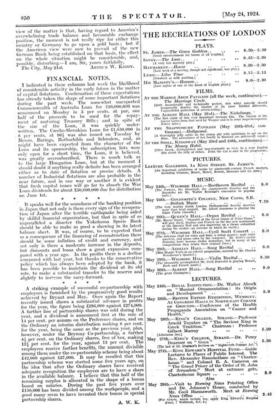FINANCIAL NOTES.
I indicated in these columns last week the likelihood of considerable activity in the early future in the matter of capital flotations. Confirmation of these expectations has already taken the shape of some important flotations during the past week. The somewhat unexpected Commonwealth of Australia Loan for £10,000,000 was announced on Monday in 5 per cents, at par, one • half of the proceeds to be used for the repay- ment of maturing Treasury Bills ; and in spite of • the size of the Loan, it was quickly under- written. The Czecho-Slovakian Loan for £1,850,000 in _ 8 per cents. at 964 was also issued on Tuesday by Messrs. Barings, Rothschilds and Schroders, and, as - might have been expected from the character of the Loan and its sponsorship, the subscription lists were only open for a short time, the Loan, it is believed, was greatly oversubscribed. There is much talk as • to the large Hungarian Loan, but at the moment I • should doubt if anything really definite has been arranged either as to date of flotation or precise details. A number of Industrial flotations are also probable in the near future, and in one way or another it is evident : that fresh capital issues will go far to absorb the War Loan dividends for about 150,000,000 due for distribution on June 1st.
It speaks well for the soundness of the banking position in Japan that not only is there every sign of the recupera- tion of Japan after the terrible earthquake being aided by skilful financial organization, but that in spite of so unparalleled a disaster the Yokohama Specie Bank should be able to make as good a showing in its latest balance sheet. It was, of course, to be expected that as a consequence of the financing of reconstruction there should be some inflation of credit and currency, and not only is there a moderate increase in the deposits, but discounts and loans show a great expansion com- pared with a year ago. In the profits there is a decline compared with last year, but thanks to the conservative policy which has always been adopted by the bank, it has been possible to maintain the dividend at its old rate, to make a substantial transfer to the reserve and slightly to incrtase the carry-forward.
A striking example of successful co-partnership with employees is furnished by the progressively good results achieved by Bryant and May. Once again the Report recently issued shows a substantial advance in profits for the year, the figure being £296,000 against £274,000. A further line of partnership shares was sold during the year, and a dividend is announced first at the rate of 14 per cent, per annum on the Preference shares, and on the Ordinary an interim distribution making 8 per cent. for the year, being the same as the previous year, plus, however, under the Brymay Co-partnership, a further 44 per cent, on the Ordinary shares, free of tax, making 124. per cent. for the year, against 12 per cent. The employees receive further benefits, the amount divisible among them under the co-partnership scheme being about £42,000 against /37,000. It may be recalled that this partnership scheme was started some five years ago, on the 'idea that after the Ordinary shares have received adequate recognition the employees are to have a share in the available balance. I believe that this half of the remaining surplus is allocated in the shape of a bonus based on salaries. During the past five years over £150,000 has been divided among the workpeopk, and a good many seem to have invested their bonus in special partnership shares.
A. W. K.










































 Previous page
Previous page